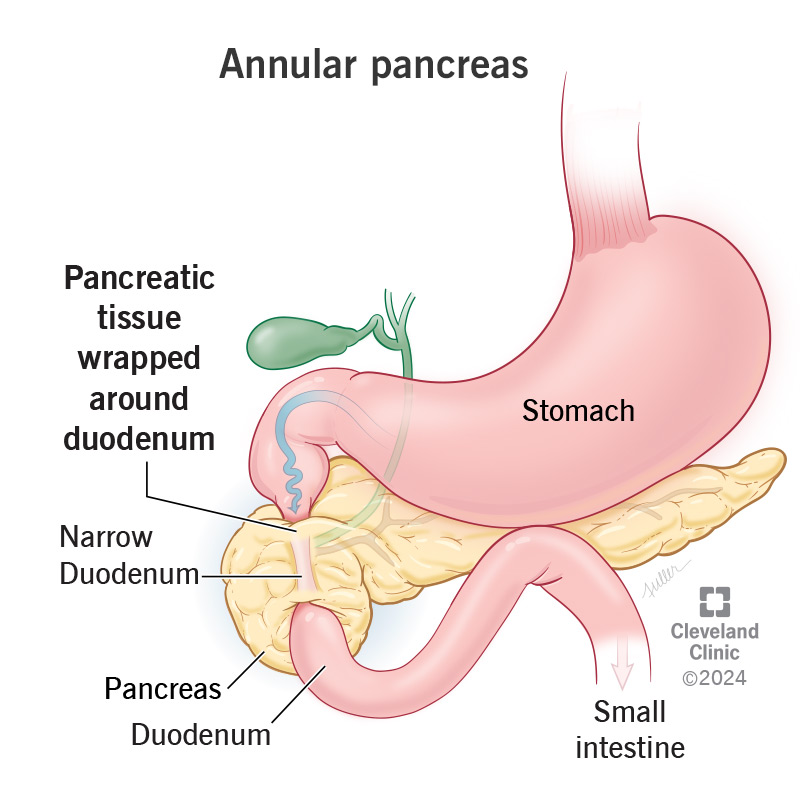Annular pancreas is a rare disorder that happens when a ring of pancreatic tissue wraps around your duodenum. It’s a congenital (present at birth) condition that may not cause symptoms. Symptoms in babies include bile in vomit and difficulty feeding. Symptoms in adults are nausea and vomiting. Complications include pancreatitis or pancreatic cancer.
Advertisement
Cleveland Clinic is a non-profit academic medical center. Advertising on our site helps support our mission. We do not endorse non-Cleveland Clinic products or services. Policy

Image content: This image is available to view online.
View image online (https://my.clevelandclinic.org/-/scassets/Images/org/health/articles/annular-pancreas.jpg)
Annular pancreas is when part of your pancreas (pancreatic tissue) wraps around your duodenum. Your duodenum is part of your small intestine.
Advertisement
Cleveland Clinic is a non-profit academic medical center. Advertising on our site helps support our mission. We do not endorse non-Cleveland Clinic products or services. Policy
In annular pancreas, there’s a ring or collar of pancreatic tissue squeezing your duodenum. (Annular is a medical term for something that forms a ring.) This makes your duodenum narrow (constrict) so food and fluid can’t move from your stomach to your small intestine.
This is a congenital condition, meaning it’s present from birth. Healthcare providers often diagnose and treat annular pancreas right after birth. But the condition may not cause symptoms. Adults often learn they have annular pancreas because they have imaging tests for another reason (incidental finding). You may learn you have annular pancreas because you develop certain conditions that affect your biliary system.
Annular pancreas is rare, but experts aren’t sure exactly how often this condition happens. For example, one analysis of adults who had abdominal imaging tests found that about 3 in 100,000 people had annular pancreas. The condition affects 1 in 20,000 newborn babies.
Annular pancreas symptoms are different in newborn babies than in adults.
Your baby may have:
Advertisement
Often, annular pancreas symptoms in adults don’t start until you’re in your 30s or even up through your 60s. Symptoms in adults include:
Annular pancreas happens during fetal development as a fetus’s pancreas begins to form. Experts don’t know the exact cause. Certain conditions increase the risk that you or your baby will have annular pancreas. Those include:
Without treatment, annular pancreas may cause complications like:
Imaging tests are the most common way that healthcare providers diagnose annular pancreas. Tests vary depending on age. For example:
Imaging tests for adults may include:
Your healthcare provider may do other tests to rule out conditions that cause the same symptoms as annular pancreas.
The best treatment for annular pancreas depends on your situation. Adults may not need treatment unless the condition causes complications like pancreatitis. In general, however, providers recommend surgery.
There are different surgical treatments for annular pancreas. But they all involve creating new ways for food from your stomach to move through your small instetine. Surgery types are:
Advertisement
Yes, you can live with this condition. For example, the outlook is good for babies who have surgery for annular pancreas. The outlook for adults depends on complications that annular pancreas may cause. If you have annular pancreas, your healthcare provider is the best person to explain what you can expect.
There’s no known way to prevent annular pancreas. The condition happens during fetal development. Experts aren’t sure why this happens.
Often, adults can have annular pancreas without symptoms. If you have annular pancreas, contact your provider if you have changes in your body, like nausea and vomiting that don’t go away within a few days.
It can be unnerving to have a rare condition like annular pancreas. Double that feeling if your newborn baby has it. This condition is a bit of a medical mystery. It happens during fetal development, but experts don’t know the exact reason why that happens. They aren’t sure why some people live for years without symptoms. But they are certain that surgery can help. Knowing surgery is a solution may help you feel more confident about your newborn baby’s health or your own.
Advertisement

Sign up for our Health Essentials emails for expert guidance on nutrition, fitness, sleep, skin care and more.
Learn more about the Health Library and our editorial process.
Cleveland Clinic’s health articles are based on evidence-backed information and review by medical professionals to ensure accuracy, reliability and up-to-date clinical standards.
Cleveland Clinic’s health articles are based on evidence-backed information and review by medical professionals to ensure accuracy, reliability and up-to-date clinical standards.
If you have issues with your digestive system, you need a team of experts you can trust. Our gastroenterology specialists at Cleveland Clinic can help.
